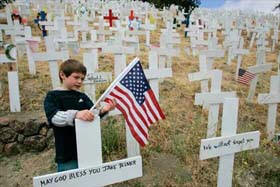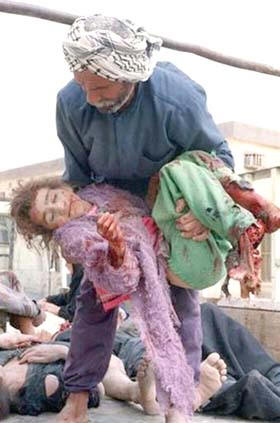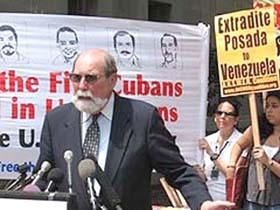
August 2, 2008
Bush Made the World More Dangerous

August 2, 2008
Bush Made the World More Dangerous
Wayne Smith, former head of the US Interests Section in Havana, tells Granma newspaper.
DEISY FRANCIS MEXIDOR
People say that on the walls of Wayne Smith’s office are maps and photos of Latin American countries and an old wooden sign in Russian that reads: “Hands off of Cuba.” In recent years, he has been a defender of normalizing relations between the United States and Cuba.

 THE
WAR IN IRAQ HAS BEEN NOTHING MORE THAN A BLOODY AND HIGHLY COSTLY DISTRACTION.
THE
WAR IN IRAQ HAS BEEN NOTHING MORE THAN A BLOODY AND HIGHLY COSTLY DISTRACTION.
A career diplomat, for 25 years he worked for the US State Department (1957-1982). He served as executive secretary of the team of President John Kennedy for Latin America; as representative in Argentina, Brazil and the former Soviet Union; and as head of the US Interests Section in Havana from the end of the 1970s to the early 1980s.
 WAYNE SMITH
WAYNE SMITH
Today, Wayne Smith, goes between teaching classes at John Hopkins University in Baltimore and the Center for International Policy, in Washington, an independent academic forum that supports the elimination of travel restrictions between the US and Cuba.
Cuba recently denounced the activities of US Interests Section officials in Havana, especially its head, Michael Parmly whom they accused of being a facilitator of trafficking funds between members of small internal counterrevolutionary groups and Cuban-American terrorist Santiago Alvarez Fernandez-Magriña, convicted by a Florida court of illegal weapons possession. Smith responded to a number of questions from Granma by e-mail, in which he said the action of Parmly constitutes a violation of diplomatic norms.
What would happen if this had happened in reverse?
WAYNE SMITH: Had a foreign diplomatic establishment in Washington been guilty of such a violation, I think it likely that the Department of State would have asked for the recall of the diplomats involved – unless there were some compelling political reason not to do so.
What are your comments on the judicial protection the judges grant Santiago Alvarez and the show around Luis Posada Carriles?
WS: These gentlemen have deferred to Santiago Alvarez and even more so to Luis Posada Carriles in ways which weaken respect for law in the U.S. The law is clear: either Posada Carriles must be extradited to Venezuela, as that government has requested, or he must be tried as a terrorist in the United States. To do neither is to flout the law.
How can it be explained that Bush said “he who protects a
terrorist is also a terrorist,” and in the US protection is given to criminals
like Luis Posada Carriles, Orlando Bosch, Rodolfo Frometa and so many others?
WS: Yes, George Bush has often said that anyone who shelters or protects a
terrorist is a terrorist. But one must then wonder, given that the Bush
Administration has sheltered and given preferential treatment to arch-terrorists
such as Luis Posada Carriles and Orlando Bosch, how can it then avoid the
“terrorist” label?
How much is known about the Cuban Five in your country?
WS: There is a growing campaign in the U.S. to make known to the American people the truth about the Cuban Five. At this point, however, the average American is unaware and tends to think of them simply as “Cuban spies.”
Not long ago, a three judge panel of the Court of Appeals of Atlanta issued a ruling that confirmed the guilt of the Cuban Five, maintaining the sentence against two of them, Rene Gonzalez and Gerardo Hernandez, and asked for a re-sentencing for Ramon Labanino, Fernando Gonzalez and Antonio Guerrero, in a new hearing in Miami.
Your comments on that ruling.
WS: In my view, the decision of the three judges in Atlanta with respect to the Cuban Five was simply wrong and would seem to have been politically inspired. At some point, let us hope, justice will be done.
Do the US people know the extent of their government’s involvement in acts of terrorism?
WS: No. Most Americans are unaware of the degree to which their government has been involved in terrorist acts. They are, however, beginning to learn.
At seven years since Bush’s declaration of his war against terror, do you believe he has accomplished his objectives? Is the world a safer place?
WS: No. Bush’s call for an open-ended “global war” on terrorism has left us with a world that is far more dangerous. It is tragic, really.
Immediately after 9/11, the world stood with the United States. That included the Cuban government, which immediately expressed its solidarity with the American people and offered to cooperate with the United States in a struggle against terrorism. The Bush Administration did not even reply.
Had Bush concentrated the efforts of the U.S. against Al-Qaeda in Afghanistan and worked within the international system and with full respect for international law, it would have continued to have support of most other governments, including the Cuban. Rather than that, however, it soon downgraded its efforts in Afghanistan against Al-Qaeda and invaded Iraq. Saddam Hussein had nothing to do with Al-Qaeda nor the terrorist attacks of 9/11 against the U.S. The war in Iraq has been nothing but a bloody, destructive and costly distraction, and one not supported by the international community.
And then Bush also adopted the doctrine of preventive war, giving the U.S. the right to attack any nation it judged to be a threat to the U.S., whether the United Nations or anyone else agreed with that. He also insisted upon claiming vast prerogatives of the presidency on all matters related to national security, whether those were within the Constitution or not, thus undercutting if not eviscerating the careful system of checks and balances. It will take other presidents years to correct this situation left to us by George W. Bush. And meanwhile, it has resulted in loss of respect and support for the U.S. within the international community.
Are US citizens well informed?
WS: Americans are not nearly as well informed as they should be, especially
about foreign policy matters. That they are beginning to wake up and be better
informed, however, is suggested by the fact that support for and confidence in
the Bush Administration has reached an all-time low. In other words, the more
Americans learn about Bush’s foreign policy, the less they like it!
You are in an electoral year in the US. The world eagerly awaits the results of the November elections. Barack Obama or John McCain?
We’ll see. I’m betting on Obama.
http://www.granma.cubaweb.cu/english/news/art103.html

La “guerra global” de Bush ha
dejado un mundo más peligroso
Afirma a Granma Wayne Smith, ex jefe de la Sección de Intereses de Washington en La Habana
DEISY FRANCIS MEXIDOR
Francis_mexidor@granma.cip.cu
http://www.granma.cubaweb.cu/2008/08/01/interna/artic01.html
Dicen que en las paredes de su oficina hay mapas y fotos de algunos países latinoamericanos, y una vieja tabla con un letrero en ruso que expresa: "Manos fuera de Cuba". En los últimos años ha sido defensor de la normalización de las relaciones entre su país, Estados Unidos, y la Isla antillana.

 La
guerra en Iraq no ha sido más que una distracción sangrienta y sumamente
costosa.
La
guerra en Iraq no ha sido más que una distracción sangrienta y sumamente
costosa.
Diplomático de carrera. Durante 25 años prestó servicios en el Departamento de Estado (1957-1982), tiempo que le sirvió para ejercer, entre otros cargos, como secretario ejecutivo del equipo del presidente John Kennedy para América Latina, representante en Argentina, Brasil, la antigua Unión Soviética y jefe de la Sección de Intereses de la Casa Blanca en La Habana a finales de la década del setenta e inicios de los ochenta.
 Wayne
Smith.
Wayne
Smith.
Ahora Wayne Smith, alterna sus clases en la Universidad John Hopkins, de Baltimore, con el Centro de Política Internacional, en Washington, un foro académico independiente, que aboga dentro de sus propósitos por la eliminación de las restricciones de viajes entre ambas naciones.
Recientemente, Cuba denunció las actividades impropias de funcionarios de la SINA en esta capital, especialmente de su jefe, Michael Parmly: facilitador del trasiego de dinero entre integrantes de grupúsculos de la contrarrevolución interna y el terrorista de origen cubano Santiago Álvarez Fernández-Magriñá, condenado por un tribunal de Florida por posesión ilegal de armas. Hecho que "constituye una violación de las normas diplomáticas", según comentara Smith al responder las interrogantes de Granma, vía correo electrónico.
¿Qué sucedería si esta acción fuese a la inversa?
Si un establecimiento diplomático extranjero en Washington fuera culpable de una violación como esa, creo que sería probable que el Departamento de Estado hubiera pedido la retirada de los diplomáticos implicados —si no fuera por un motivo político convincente para no hacerlo.
¿Qué opinión le merece en la cuestión jurídica el amparo de los jueces a Santiago Álvarez Fernández-Magriñá y el show en torno a Luis Posada Carriles?
Estos señores han protegido a Santiago Álvarez, y aun más, a Luis Posada Carriles de una manera que debilita el respeto por la ley en EE.UU.
La ley es clara: o hay que extraditar a Posada Carriles a Venezuela, como ha pedido ese Gobierno, o hay que juzgarlo como terrorista en Estados Unidos. No hacer ninguna de las dos cosas es desacatar abiertamente a la ley.
¿Cómo se explica que si Bush dijo que "quien proteja a un terrorista es también un terrorista", en Estados Unidos se le dé protección a criminales como Luis Posada Carriles, Orlando Bosch, Rodolfo Frómeta y tantos otros?
Sí, George Bush ha dicho frecuentemente que quien da refugio o protege a un terrorista es un terrorista. Entonces uno tiene que preguntarse, dado que la administración de Bush ha brindado refugio y tratamiento preferencial a archi-terroristas como Luis Posada Carriles y Orlando Bosch, ¿cómo puede evitar la etiqueta de "terrorista"?
¿Cuánto se conoce sobre los Cinco en su país?
Hay una creciente campaña en Estados Unidos a favor de dar a conocer al pueblo norteamericano la verdad sobre los Cinco. En este momento, sin embargo, el norteamericano de a pie desconoce el caso, y tiende a pensar en ellos simplemente como los "espías cubanos".
Hace poco el panel de tres jueces de la Corte de Apelaciones de Atlanta emitió el fallo que confirma la culpabilidad de los Cinco, mantiene la condena de dos de ellos, René González y Gerardo Hernández, y pide una resentencia para Ramón Labañino, Fernando González y Antonio Guerrero, en una nueva audiencia en Miami.
Su comentario acerca de esta decisión.
En mi opinión, la decisión de los tres jueces en Atlanta con respecto a los Cinco fue simplemente equivocada, y parece que fue inspirada políticamente. En algún momento, esperamos, se hará justicia.
¿Sabe el pueblo de Estados Unidos cuán involucrado ha estado su gobierno en actos de terrorismo?
No. La mayoría de los estadounidenses ignora hasta qué punto su gobierno ha estado involucrado en tales actos terroristas. Sin embargo, empiezan a conocerlo.
A siete años de la declaración de Bush de su guerra global contra el terror. ¿Considera que se han logrado los objetivos? ¿Es más seguro el mundo?
No. El llamado de Bush por una "guerra global" de duración indefinida contra el terrorismo nos ha dejado un mundo que es mucho más peligroso. Es trágico, en realidad.
Inmediatamente después del 11 de septiembre, el mundo estuvo al lado de los Estados Unidos. Eso incluyó al Gobierno cubano, que enseguida expresó su solidaridad con el pueblo norteamericano y se brindó a cooperar con Estados Unidos en una lucha contra el terrorismo. La administración de Bush ni respondió.
Si Bush hubiera enfocado los esfuerzos de Estados Unidos contra Al-Qaeda en Afganistán y si hubiera trabajado dentro del sistema internacional y con pleno respeto hacia la ley internacional, hubiera mantenido el apoyo de la mayoría de los otros gobiernos, incluso el cubano. Pero en vez de eso, rápidamente redujo sus esfuerzos en Afganistán contra Al-Qaeda e invadió a Iraq. Saddam Hussein no tuvo nada que ver con Al-Qaeda ni con los ataques terroristas del 11 de septiembre. La guerra en Iraq no ha sido más que una distracción sangrienta y costosa, y sin el apoyo de la comunidad internacional.
Luego, Bush también adoptó la doctrina de la guerra preventiva, dando a EE.UU. el derecho de atacar a cualquier nación que ellos perciban como una amenaza, independientemente de si las Naciones Unidas o alguien más está o no de acuerdo. Además, insistió en reclamar prerrogativas amplísimas de la presidencia con respecto a cualquier asunto relacionado con la seguridad nacional, sin tener en cuenta si esas estaban establecidas o no en la Constitución. Para otro presidente, va a tomar años corregir esta situación que nos ha dejado George W. Bush. Y mientras tanto, ha resultado en la pérdida del respeto y apoyo por EE.UU. dentro de la comunidad internacional.
¿Los norteamericanos están bien informados?
Los norteamericanos no están ni cerca de hallarse bien informados, particularmente sobre asuntos de la política extranjera. Empiezan a despertarse y se puede inferir por el hecho de que el apoyo por y la confianza en la administración de Bush han llegado a un bajón sin precedentes. En otras palabras, ¡mientras más conocen sobre la política extranjera de Bush, menos les gusta!
Ustedes viven un año electoral. El mundo aguarda expectante los resultados de las elecciones de noviembre. ¿Barack Obama o John McCain?
Vamos a ver. Apuesto a Obama.